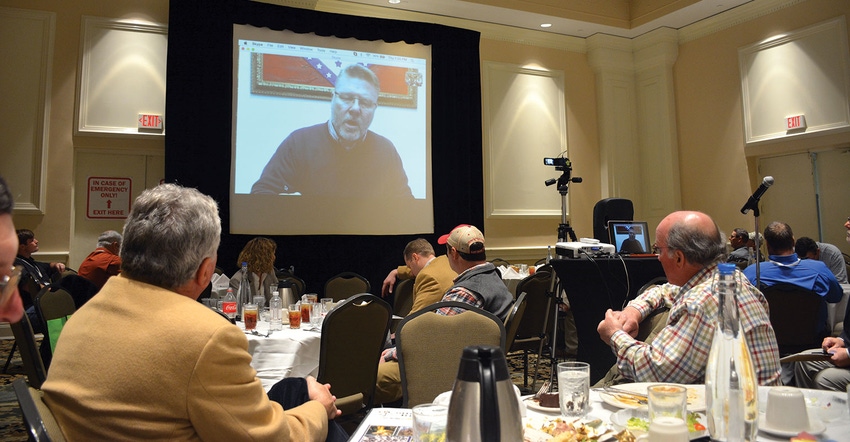
The mid-term election that gave Democrats control of the House of Representatives underscores the need for farmers and others in the agriculture industry to increase efforts to educate legislators and the public on the contributions farmers make to the U.S. economy and national security, says Rep. Rick Crawford, R-Ark.
“Farm policy, unfortunately, is now debated and adjudicated in the court of public opinion,” said Crawford, during a keynote Skype address at the 22nd annual Cotton and Rice Conservation Systems Conference in Baton Rouge, La.
Crawford, representing Arkansas’ 1st District, said a growing concern for agriculture is the “big gap between rural and urban America. We see a lack of knowledge and understanding of rural America.”
He added that many residents of his district do not know that they live in the top rice production area in the nation. “They have no idea of the contribution farmers make to the economy.”
He also said that food security and national security are intertwined. “Countries that cannot feed and clothe themselves are vulnerable.”
New Leadership in House
Crawford said the House Ag Committee has been reorganized with Democrats in charge and priorities will change. Climate change, he added, may take precedence over, “the production issues that would be your top priorities.”
He said 2014 farm policy took away direct payments. “Next, they will come after crop insurance.”
The Agricultural Improvement act of 2018, Crawford said, maintained the basic structure of the 2014 law. “We got cotton into PLC and now you have annual selection for PLC and ARC instead of signing for the life of the fam bill.
“We got the bill done and we got it done on time. But
I’m already working on the next one. Five years goes by fast and I don’t want to be caught on my heels in 2023. We need your input to develop the next farm bill.”
He said new House Agriculture Committee Chairman Colin Peterson, D-Minn., has been good to work with. “He understands rice and how commodities need to work together. He has been a big help and is a friend. We can work with him.”
Crawford said he will reintroduce a bill this session to improve trade opportunities with Cuba. “It’s the same bill I introduced last session,” he said. “I believe we now have a more favorable environment in the House.”
Cuba itself may be the biggest stumbling block, however. “The sonic attack on U.S. diplomats has not been resolved. Now, Canada has bee the subject of a sonic attack.”
He said trade with Cuba is important to the U.S. ag economy. “Russia and China are interested in enhancing trade with Cuba, and we’re just 90 miles away.
“Some parties in Cuba are against enhanced trade with the U.S. and some in the U.S. are against it.”
Crawford also will introduce a bill to “remove and replace the H2A worker program, which is highly flawed. It is way more expensive than hiring domestic workers.”
He added that agriculture “needs an ag immigration fix. But for now, the wall is taking all the oxygen. I believe we need a wall, but it must have doors in it.”
He said a system to allow workers to move back and forth across the border, with a means to determine who they are and where they are should be workable.
China's Unfair Trade
Responding to a question from the audience, Crawford said the trade war with China has been “inconvenient, but it had to happen,” to get China to the negotiation table. Unfair trade practices, mis-reporting of crops and stocks, he said, in addition to “flat out lies,” must be corrected.
“They are better at marketing than we are. But their economy is in dire straits, and that’s why they are at the table.”
He said China gets unfair preferential treatment from WTO as an emerging nation. “They have arrived.”
Finally, in response to an audience question, Crawford said he “has a gut feeling that we will not see another government shutdown. No one wants to go through that again. If the border security issue is not resolved by Feb. 15, we may see other action, but not a shutdown.”
He said the parties need to come together and compromise.
About the Author(s)
You May Also Like






